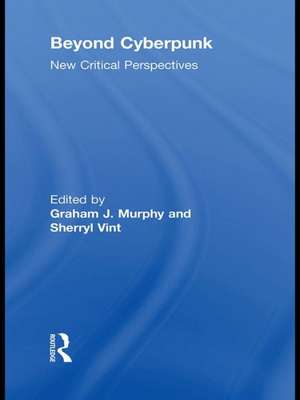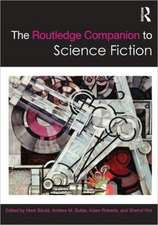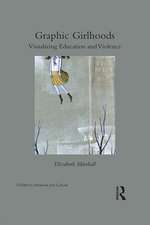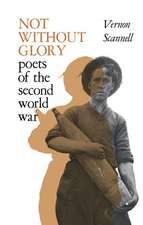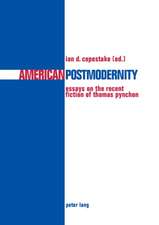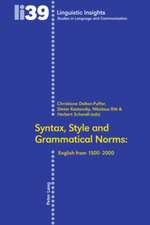Beyond Cyberpunk: New Critical Perspectives: Routledge Studies in Contemporary Literature
Editat de Graham J. Murphy, Sherryl Vinten Limba Engleză Hardback – 17 mai 2010
| Toate formatele și edițiile | Preț | Express |
|---|---|---|
| Paperback (1) | 486.21 lei 6-8 săpt. | |
| Taylor & Francis – 20 apr 2012 | 486.21 lei 6-8 săpt. | |
| Hardback (1) | 1062.62 lei 6-8 săpt. | |
| Taylor & Francis – 17 mai 2010 | 1062.62 lei 6-8 săpt. |
Din seria Routledge Studies in Contemporary Literature
-
 Preț: 309.12 lei
Preț: 309.12 lei -
 Preț: 279.74 lei
Preț: 279.74 lei -
 Preț: 310.65 lei
Preț: 310.65 lei -
 Preț: 341.63 lei
Preț: 341.63 lei - 5%
 Preț: 293.92 lei
Preț: 293.92 lei -
 Preț: 281.18 lei
Preț: 281.18 lei - 20%
 Preț: 295.91 lei
Preț: 295.91 lei - 18%
 Preț: 1053.16 lei
Preț: 1053.16 lei - 26%
 Preț: 763.31 lei
Preț: 763.31 lei - 26%
 Preț: 763.78 lei
Preț: 763.78 lei -
 Preț: 408.38 lei
Preț: 408.38 lei - 18%
 Preț: 1052.35 lei
Preț: 1052.35 lei - 18%
 Preț: 1007.06 lei
Preț: 1007.06 lei - 12%
 Preț: 325.34 lei
Preț: 325.34 lei -
 Preț: 444.62 lei
Preț: 444.62 lei - 18%
 Preț: 1002.95 lei
Preț: 1002.95 lei - 18%
 Preț: 1000.27 lei
Preț: 1000.27 lei - 30%
 Preț: 847.75 lei
Preț: 847.75 lei - 18%
 Preț: 1105.56 lei
Preț: 1105.56 lei - 18%
 Preț: 1057.75 lei
Preț: 1057.75 lei - 31%
 Preț: 763.81 lei
Preț: 763.81 lei - 18%
 Preț: 1109.18 lei
Preț: 1109.18 lei - 26%
 Preț: 765.04 lei
Preț: 765.04 lei - 5%
 Preț: 395.41 lei
Preț: 395.41 lei - 12%
 Preț: 312.43 lei
Preț: 312.43 lei - 18%
 Preț: 312.34 lei
Preț: 312.34 lei - 31%
 Preț: 764.30 lei
Preț: 764.30 lei - 23%
 Preț: 832.90 lei
Preț: 832.90 lei - 12%
 Preț: 325.34 lei
Preț: 325.34 lei - 5%
 Preț: 1220.12 lei
Preț: 1220.12 lei - 31%
 Preț: 761.78 lei
Preț: 761.78 lei - 28%
 Preț: 822.54 lei
Preț: 822.54 lei - 18%
 Preț: 1002.63 lei
Preț: 1002.63 lei - 18%
 Preț: 708.67 lei
Preț: 708.67 lei - 18%
 Preț: 1003.30 lei
Preț: 1003.30 lei - 18%
 Preț: 1000.27 lei
Preț: 1000.27 lei - 18%
 Preț: 1000.27 lei
Preț: 1000.27 lei - 18%
 Preț: 1113.12 lei
Preț: 1113.12 lei - 18%
 Preț: 1109.99 lei
Preț: 1109.99 lei - 18%
 Preț: 999.79 lei
Preț: 999.79 lei - 18%
 Preț: 1013.04 lei
Preț: 1013.04 lei
Preț: 1062.62 lei
Preț vechi: 1295.88 lei
-18% Nou
Puncte Express: 1594
Preț estimativ în valută:
203.34€ • 217.43$ • 169.53£
203.34€ • 217.43$ • 169.53£
Carte tipărită la comandă
Livrare economică 17 aprilie-01 mai
Preluare comenzi: 021 569.72.76
Specificații
ISBN-13: 9780415876872
ISBN-10: 0415876877
Pagini: 282
Ilustrații: 1 table
Dimensiuni: 152 x 229 x 20 mm
Greutate: 0.68 kg
Ediția:New.
Editura: Taylor & Francis
Colecția Routledge
Seria Routledge Studies in Contemporary Literature
Locul publicării:Oxford, United Kingdom
ISBN-10: 0415876877
Pagini: 282
Ilustrații: 1 table
Dimensiuni: 152 x 229 x 20 mm
Greutate: 0.68 kg
Ediția:New.
Editura: Taylor & Francis
Colecția Routledge
Seria Routledge Studies in Contemporary Literature
Locul publicării:Oxford, United Kingdom
Public țintă
Postgraduate and UndergraduateCuprins
Acknowledgments Introduction: The Sea Change(s) of Cyberpunk, Graham J. Murphy and Sherryl Vint Part One: Situating Cyberpunk 1. Towards a Poetics of Cyberpunk, Brian McHale 2. "A Rare State of Ferment": SF Controversies from the New Wave to Cyberpunk, Rob Latham 3. Recognizing Patterns: Gibson’s Hermeneutics from the Bridge Trilogy to Pattern Recognition, Neil Easterbrook 4. Journeys Beyond Being: The Cyberpunk-Flavored Novels of Jeff Noon, Andrew M. Butler Part Two: The Political Economy of Cyberpunk 5. Global Economy, Local Texts: Utopian/Dystopian Tension in William Gibson’s Cyberpunk Trilogy, Tom Moylan 6. "The Mainstream Finds its Own Uses for Things": Cyberpunk and Commodification, Sherryl Vint 7. Why Neo Flies, and Why He Shouldn’t: The Critique of Cyberpunk in Gwyneth Jones’s Escape Plans and M. John Harrison’s Signs of Life, Mark Bould 8. Posthuman Melancholy: Digital Gaming and Cyberpunk, Jonathan Boulter Part Three: The Politics of Embodiment in Cyberpunk 9. Feminist Cyberpunk, Karen Cadora 10. Woken Carbon: The Return of the Human in Richard K. Morgan’s Takeshi Kovacs Trilogy, Pawel Frelik 11. Retrofitting Frankenstein, Veronica Hollinger 12. Angel(LINK) of Harlem: Techno-Spirituality in the Cyberpunk Tradition, Graham J. Murphy Afterword: The World Gibson Made, Sherryl Vint Notes on Contributors Bibliography Index
Recenzii
"Recommended."-- J. B. Jones, Central Connecticut State University, Choice
Descriere
In this collection of essays, contributors consider the continuing cultural relevance of the cyberpunk genre into the new millennium. Cyberpunk is no longer an emergent phenomenon, but in our digital age of CGI-driven entertainment, the information economy, and globalized capital, we have never more been in need of a fiction capable of engaging with a world shaped by information technology. Contributors seek to move beyond the narrow strictures of cyberpunk as defined in the Eighties and contribute to an ongoing discussion of how to negotiate exchanges among information technologies, global capitalism, and human social existence. Essays offer a variety of perspectives on cyberpunk’s diversity and how this sub-genre remains relevant amidst its transformation from a print fiction genre into a more generalized set of cultural practices, tackling the question of what it is that cyberpunk narratives continue to offer us in those intersections of literary, cultural, theoretical, academic, and technocultural environments.
